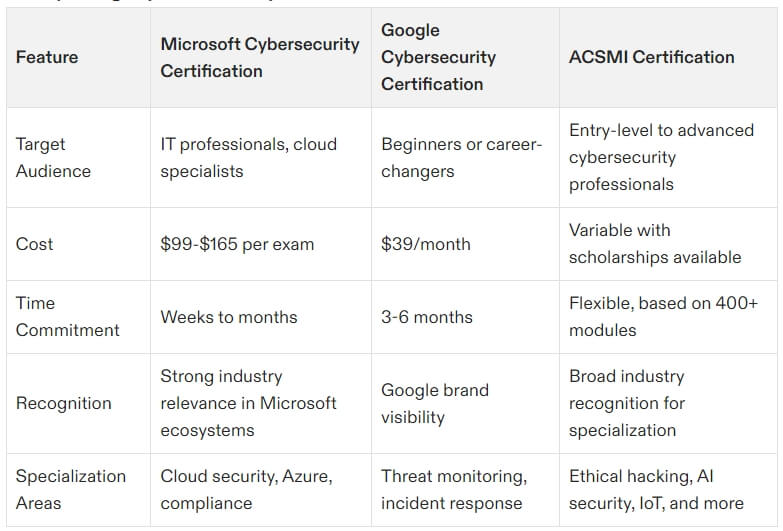Table of Contents
With the rise in cyber threats and the increasing demand for skilled cybersecurity professionals, certifications have become a critical step for breaking into or advancing within this high-stakes industry. Both Microsoft Cybersecurity Certification and Google’s Cybersecurity Certification rank among the most sought-after programs. While they have distinct strengths and cater to different needs, deciding between them can shape the trajectory of your career. This detailed guide dives into Microsoft cybersecurity certification vs Google, providing the insights you need to make the right choice for your professional growth. From cost and structure to career opportunities, we will break down everything you need to know.
Overview of Microsoft Cybersecurity Certification
Microsoft’s cybersecurity certifications are part of its comprehensive role-based learning tracks. These certifications, such as the Microsoft Certified: Security, Compliance, and Identity Fundamentals (SC-900) and higher-level credentials like the Microsoft Certified Azure Security Engineer Associate, cater to a wide range of skill levels.
Key Features of Microsoft Cybersecurity Certification
- Focus: Strong emphasis on cloud security, Zero Trust models, and system integration within Azure and Windows environments.
- Flexibility: Offers learning paths for individuals with no experience to advanced professionals.
- Recognition: Widely recognized in organizations that use Microsoft technologies.
- Cost: Exam fees generally range between $99 and $165, depending on the certification level.
Overview of Google Cybersecurity Certification
Google’s Cybersecurity program, delivered through platforms like Coursera, is designed for beginners aiming to build foundational skills. It focuses on entry-level areas such as threat detection and incident response, making it ideal for those new to the field.
Key Features of Google Cybersecurity Certification
- Focus: Entry-level tools and techniques, including monitoring threats and securing systems.
- Accessibility: Tailored for individuals with no prior IT experience.
- Recognition: Associated with Google’s strong, globally recognized branding.
- Cost: Subscription-based, costing $39/month with an average completion time of 3-6 months.
Microsoft Cybersecurity Certification vs Google
Both certifications have strengths and limitations. Here’s a closer look to help you determine the best option for your career aspirations.
Cost Comparison
Google’s pay-as-you-go structure ($39/month) is budget-friendly for those completing it quickly. Microsoft, however, charges per certification exam, with fees ranging from $99 to $165. While the initial cost for Microsoft may seem higher, its specialized focus often yields a greater return on investment, especially for professionals targeting roles in Microsoft-centric environments.
Target Audience
Google Cybersecurity Certification is aimed at beginners or those switching careers. On the other hand, Microsoft’s certifications are highly relevant for individuals already working in or aspiring to engage with roles involving Windows, Azure, or enterprise-level cybersecurity.
Career Progression
Both certifications enhance employability, but the roles they prepare you for differ. Google’s program opens doors to entry-level positions, such as Security Analyst or IT Support Specialist. Microsoft’s credentials, especially at the advanced levels, qualify professionals for roles like Security Engineer, Identity Manager, or Cloud Security Specialist, which demand in-depth knowledge.
Why Consider ACSMI Certification?
While choosing between Microsoft cybersecurity certification vs Google, it’s worth exploring additional programs like ACSMI (Advanced Cyber Security Mastery Institute). ACSMI offers significant specialization through its 400+ modules, covering advanced topics such as ethical hacking, AI security, and IoT threat management. This makes it an excellent complement to vendor-specific certifications like Microsoft’s or Google’s. Learn more about ACSMI to see its potential for your career.
FAQs
microsoft cybersecurity certification vs google
1. Which is easier, Microsoft Cybersecurity Certification or Google?
Google is generally easier for beginners, offering a streamlined, self-paced program. Microsoft, while accessible at fundamental levels, requires more robust technical knowledge for its advanced certifications.
2. Which is more affordable?
Google’s subscription model, at $39/month, is more affordable for rapid learners. Microsoft’s certifications range from $99 to $165 per exam, which can accumulate depending on the number of certifications pursued.
3. Which is better for advanced cybersecurity roles?
Microsoft’s certifications cater more comprehensively to advanced roles in enterprise environments, particularly within organizations utilizing Azure or Windows. Google’s program is better suited for entry-level roles.
4. Do these certifications expire?
Yes. Microsoft certifications typically need renewal every certification cycle (2-3 years), maintaining alignment with technological advancements. Google’s certification encourages continuous learning but does not have mandatory renewal requirements yet.
5. Can I pursue both certifications?
Absolutely. Starting with Google for foundational knowledge is a great idea, especially if you’re new to cybersecurity. Microsoft’s certifications can then build on that base to prepare you for specialized roles.
6. What jobs can I land with these certifications?
Google prepares you for roles like Security Analyst, IT Support Specialist, or Threat Monitoring Professional. Microsoft certifications qualify you for more technical positions, such as Azure Security Engineer, Cloud Security Consultant, or Compliance Specialist.
7. How long does it take to complete these certifications?
Google’s program takes 3-6 months on average. Microsoft certifications vary based on the exam but generally require several weeks to a few months of preparation, particularly for intermediate or advanced levels.
8. What learning resources are available?
Google provides video tutorials, quizzes, and hands-on labs through Coursera. Microsoft offers official training via Microsoft Learn, as well as paid resources like instructor-led courses and exam prep materials.
Certification Insights
Comparing Cybersecurity Certifications
“microsoft cybersecurity certification vs google”
With these details in mind, you can confidently weigh your options when deciding between Microsoft cybersecurity certification vs Google. And if you’re looking for even greater specialization? Check out ACSMI for a well-rounded, customizable program designed to elevate your skills.
Real-World Success Story: Boosting Careers with Cybersecurity Certifications
Certifications can be life-changing, as highlighted by the story of Sarah Mitchell, a career-changer who transitioned from teaching into cybersecurity. Sara considered the options of Microsoft Cybersecurity Certification vs Google when looking for an accessible way to break into the field.
Initially drawn to Google’s Cybersecurity Certification due to its beginner-friendly approach, Sarah found the self-paced structure ideal while balancing her full-time teaching job. Within four months, she gained foundational knowledge in threat detection and incident response, earning her first role as an IT Support Specialist at a mid-sized company.
However, Sarah hit a roadblock when her organization began to migrate its operations onto Microsoft Azure, and additional knowledge of cloud security became crucial to her role. To stay ahead of the curve, she pursued the Microsoft Certified Azure Security Engineer Associate credential. The hands-on focus and targeted expertise of Microsoft’s certification allowed Sarah to quickly grasp complex topics like Zero Trust security models and Azure-specific compliance protocols.
Post-certification, Sarah transitioned to a Cloud Security Analyst position within her organization, doubling her salary within two years and becoming a critical team member in safeguarding their infrastructure.
Her employer also benefited significantly. With the combination of Google’s certification for foundational knowledge and Microsoft’s Azure credentials for advanced specialization, Sarah helped the company not only secure its digital landscape but also reduce downtime incidents by 35% due to improved threat response strategies she devised.
Sarah’s story underscores that certifications are more than just credentials. By choosing the right program for her skill level and growth goals, she was able to overcome early challenges and craft a career trajectory that aligned with her aspirations. Her success illustrates how Microsoft Cybersecurity Certification vs Google isn’t necessarily an either/or question. Instead, the two programs can complement each other for a well-rounded skill set that keeps both individuals and organizations resilient in a rapidly changing threat landscape.
This real-world example demonstrates that, with the right determination and a strategic approach to certifications, you can elevate your career and become a vital asset to any organization.


Leave a Reply